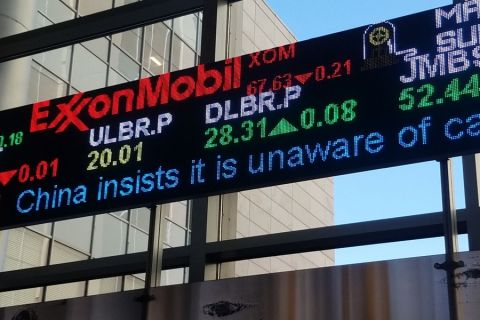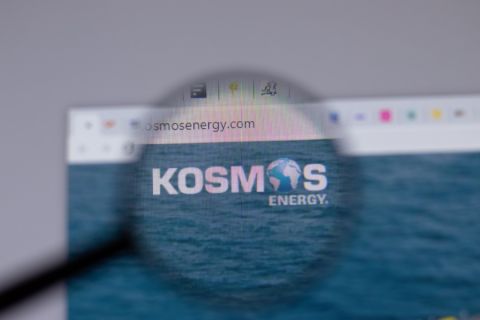The 1973 Arab oil embargo heightened U.S. concerns about energy security. Oil security in particular was something of an obsession for countries that relied on imported oil. But it was especially alarming for the U.S. because then—and now—the country is the world’s largest consumer of oil.
“Right now, we’re consuming about a fifth of global oil. We’ve got about 4% of the global population,” said Jim Krane, the Wallace S. Wilson Fellow for Energy Studies at Rice University’s Baker Institute for Public Policy. “We are a disproportionate oil consumer, which means we’re disproportionately exposed to political risks in the oil market.”
A key difference between now and then is that the U.S. is now a net exporter of oil—achieving the status in 2020 for the first time since 1949, according to the Energy Information Administration (EIA). But that doesn’t remove the risk. In the global oil market, the biggest exporting countries exert the most control over prices.
“That means the U.S. exposes itself seemingly willingly to political risk in the oil markets because we drive really big and inefficient vehicles and have much longer average commutes than just about everybody else in the world,” Krane told me. “In other countries, they don’t drive an hour each way to work in a Chevy Suburban.”
Indeed, U.S. growth in the SUV market from 1990 to 2021 raised the weight of the average new vehicle 25%, increased horsepower by 87% and acceleration by 33%, according to a report from the Center for Sustainable Systems at the University of Michigan.
What’s next?
But might the energy transition—and more specifically, the Inflation Reduction Act’s (IRA) multi-billion-dollar decarbonization roadmap—switch things up? Or, is a carbon tax the answer to “What’s next for domestic energy policy?”
One aspect of the IRA is a consumer tax credit for the purchase of electric vehicles (EVs). That’s one way consumers could protect themselves from swinging gasoline prices, Krane said.
The EIA reported in September that the number of light-duty electric vehicles on the road in 2021 surpassed 2 million—a dramatic increase from the 100,000 EVs registered in 2012.
Still, Krane said, that might knock off up to 2 MMbbl/d worth of oil demand in the U.S.
“That might be a pessimistic outlook, but less than 10%, I think it’s probably safe to say, by 2030,” he said.
Diminishing the U.S. exposure to volatility in global markets comes down to policy promulgated by the people, i.e., the voters and consumers who actually drive demand.
“If you see more U.S. voters choosing to drive electric vehicles, they’re going to be insulating themselves from gasoline prices and insulating themselves from oil market risk. So, if enough American voters are driving electric vehicles, the president might have a little bit more freedom of action to deal with Saudi Arabia and company when they are behaving in ways that the U.S. doesn’t appreciate,” Krane said.
Carbon tax
Despite its often audible, occasionally bipartisan support, a carbon tax has yet to fully capture policymakers’ attention.
“We’re kind of lurching, if you will, to a lower-carbon energy profile for consumption. None of that’s going to change until it confronts the consumer every day,” Ed Hirs, University of Houston lecturer and energy economist, told me.
“I have fond hopes that, if this really is a national prerogative, we’ll get it passed in the next five, 10 years.”
Several top U.S. producers, including Exxon Mobil, ConocoPhillips and Chevron, have endorsed the idea of a carbon tax to varying degrees. A 2020 Pew Research Center survey of 10,957 U.S. adults found that 73% favored taxing corporations based on their carbon emissions.
So, what’s the problem?
“Every politician I’ve ever spoken to says that, ‘If the price goes up at the pump or the price goes up at the meter, we don’t get re-elected,’” Hirs said.
“It all comes down to the consumer making a choice at the checkout counter, at the car dealership. Until the price of carbon, the price of methane, gets reflected in that decision calculus, it’s going to be kind of slow.”
Recommended Reading
What's Affecting Oil Prices This Week? (April 29, 2024)
2024-04-29 - Stratas Advisors says even with the reported drawdown in U.S. crude inventories, the price of Brent crude oil remains below the upward channel that had been in place since January of this year.
Tivoli Midstream Buys Southeast Texas Coast Infrastructure
2024-04-29 - Tivoli Midstream acquired the Chocolate Bayou from Ascend Performance Materials, including storage and land for development.
Markman: Want CO2 Gone Now? Well, You Don’t Always Get What You Want
2024-04-29 - A slew of scenarios shows that climate goals can be achieved with the use of fossil fuels and CCUS.
ProPetro to Provide eFrac Services to Exxon’s Permian Operations
2024-04-29 - ProPetro has entered a three-year agreement to provide electric hydraulic fracturing services for Exxon Mobil’s operations in the Permian Basin.
Kosmos Energy’s RBL Increased, Maturity Date Extended
2024-04-29 - Kosmos Energy’s reserve-based lending facility’s size has been increased by about 8% to $1.35 billion from $1.25 billion, with current commitments of approximately $1.2 billion.





